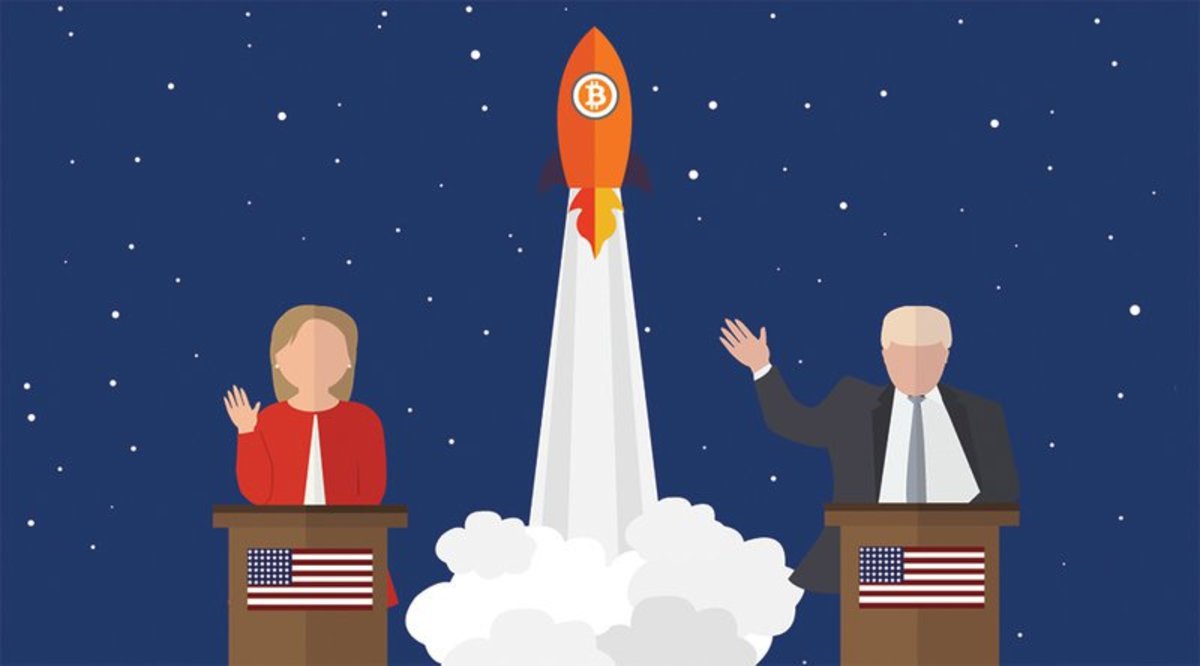
What would the impact be of a Trump or Clinton presidency on digital currencies? Politics, banking, and money are all related. Major changes in a country’s governance will have huge implications for monetary policy.
Trump
Trump is the King of Debt. He is no stranger to bankruptcy and financial leverage. His presidency would put America First, jeopardizing trade deals. He is attempting to pitch himself as a 21st century Franklin Delano Roosevelt. Roosevelt is famous for the New Deal, which involved massive infrastructure spending. While FDR is credited by many for lifting America out of the Great Depression, in reality it is much easier to rebuild your economy when your trading partners are being Blitzkrieged.
During the recent debates, Trump promised to upgrade the America’s airports, roads, bridges — and walls. That costs a lot of money. Where will this money come from? Most likely Trump will engage in massive government spending and borrowing.
In the same debate, Trump voiced concerns that the Fed has not raised interest rates. He implied that the Fed has kept rates too low for too long, and that as a result a day of reckoning will occur. If Trump is to begin a massive round of infrastructure spending, he surely doesn’t want to be doing that when the 30 year US Treasury bond yields north of 5%.
The King of Debt will want the cheapest borrowing costs possible. Which means a continuation of easy monetary policies from the Fed.
Clinton
Hillary Clinton promises more of the same. She has been wheeling and dealing in the beltway since the 1970s. Her pitch is a continuation of the policies of the past eight years. She even served as Secretary of State under Obama for a portion of that time.
More of the same means more government spending. More taxes and more goodies for everyone, both rich and poor. Contrary to the image she tries to project of a down-to-earth good ole gal, Clinton is quite comfortable eating at Dorsia with Oliver Peoples-wearing “Finānciers.”
The financial institutions are big supporters of Clinton, and she will not disappoint them; her husband didn’t, and neither will she. Massive government spending for the poor and middle class, and massive monetary printing for the moneyed elites. That is what will be on order with Clinton.
Similar to a Trump presidency, government spending will accelerate. The Fed will need keep the printing presses humming to accommodate the fiscal spending.
Same Same But Different
The Devil you know (Clinton) and the Devil you don’t (Trump) both promise to increase government spending. These bonds will be monetised by the Fed lest interest rates spike higher. The Fed will actually welcome an increased supply of government bonds to buy. As it stands, the US government is not spending enough to accommodate the Fed’s appetite for debt securities.
Central banks around the world have lamented the lack of fiscal spending. They believe that monetary policy cannot be the sole answer to economic problems. Governments need to pick up the slack. They need to engage in spending and enact policies to resolve structural economic issues.
The issuance of U.S. Treasuries has slowed. While the U.S. government runs persistent deficits, they are getting smaller. The pool of eligible bonds the Fed can buy is shrinking. That is partly why they were forced to suspend QE purchases. They faced the risk of completely owning the bond market. The Bank of Japan (BOJ) 30-year saga to end deflation resulted in the death of the Japanese Government Bond (JGB) market.
The BOJ owns so much of the supply, the market has ceased to function. The JGB market is now a ghost town. The Fed will be very happy that both presidential candidates advocate increased government spending. They desperately want to restart QE, and a President Trump or President Clinton will enable that.
For bitcoin and other digital currencies this trend is positive. The inflation brought upon by increased Fed largesse will continue to bleed into assets free from central bank manipulation.
Real estate and gold are the traditional assets savers flee to in times of inflation. The problem is that these assets are not portable and are subject to ex-post taxation. What better way to tax the rich than to raise property taxes and gold transaction taxes?
The appeal of Bitcoin is that, whether you own $1 or $1 billion worth, it costs nothing to store, it can be accessed anywhere via an internet connection, and it is unlikely to be the (successful) target of a tax grab.
This op-ed is a guest post by Arthur Hayes. The views expressed are his own and do not necessarily represent those of Bitcoin Magazine.










